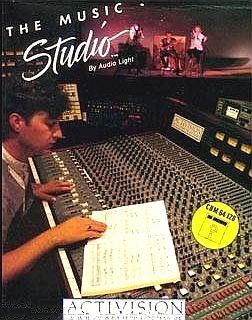- Home
- Programmers
- David Crane
- I ain't 'fraid of no ghosts!
I ain't 'fraid of no ghosts!
- By Christina Erskine
- Published 09/3/2006
- David Crane
- Unrated
|
"Normally, I would be working on something which I would be aiming at
the market about eight months later. So while everyone was writing
space games, I would know that the one thing I couldn't be doing was
writing a space game, because by the time it was finished, they could
well have gone right out of fashion." David's early programs, for those with long memories, were titles such as Dragster, Fishing Derby, Laser Blast, Freeway and Grand Prix, all for Atari VCS. The US market concentrated on video console games, as distinct from home computer games, for longer than in Britain. "When I joined Activision as a founder member, five years ago, we felt that the video game market would gradually give over to home computers by early 1985. That's more or less what happened in the USA, except that we didn't envisage video games going up, and then coming down so fast." "David's first big computer software success was with Pitfall, then Pitfall II, followed by Activision's Decathlon, which also sold well, though in this country it was rather overshadowed by Ocean's Daley Thompson product. In the US, though, he has carved out the sort of following that, say, Jeff Minter, has over here. He's always been something of an electronics whiz kid, and designed his first computer at the age of thirteen. |
|
 Dragster (Atari 2600 VCS) by Activision |
 Pitfall II (C64) By Activision |
|
"I took all the extra courses in computing and electronics that I could at High School in Indiana, which is where I come from originally. There I designed a computer specifically to play Tic-Tac-Toe." "I wasn't sure quite how momentous an achievement this was, until the language problem was solved. Tic-Tac-Toe is American for Noughts and Crosses. Well, it's a start." "By the time I left High School, I could program in three different languages, but there didn't seem to be anything very exciting I could do with that. It would have been easy to get a programming job in say a bank, but I went off to college instead to do an electronic engineering course." After leaving college, David headed for Silicon Valley, and designed microchips for a living. A friend was at the time working as a games designer for Atari, and did his best to persuade David that this was what he should be doing. "I was a little suspicious - it seems to involve an awful lot of programming. But eventually he convinced me that it would be a lot of fun, and I joined him at Atari." Whether games designing turned out to be all David hoped for or not, it's a market he definitely wants to stay in. |
|
 Music Studio by Activision |
"The industry seems to have settled down a lot in the USA now - obviously some companies are having problems, but I think there should be a stable growth in the home computer field now. I want to stay in the computer entertainment field for at least another two years, which should be very interesting, as the term entertainment is broadening out rapidly. For example, you get products now like Activision's Designer Pencil or the Music Studio, which are entertainment, but at the same time useful." I wondered how David felt about impending developments in the hardware industry, with Jack Tramiel threatening to bounce back into the limelight. "Well, we at Activision don't really mind who is battling it out for the hardware market, since we're exclusively a software company. We'll write our games for whichever machine is selling. "As for the Atari machines - I'll believe them when I see them. You can't fault Jack Tramiel's track record and there's a lot of rubber-gloved respect for him in the USA. Certainly a machine as powerful as the Macintosh at a third of the price sounds very impressive. |
|
"Then there's Commodore's C128, which as I understand will be similar to the C64, but with extra features. I'd say if we wrote for the C128 and used those features, then we ought to do it so that you can still do the game for the C64, because of its huge user base." And how does David feel about the British market? "It's a funny thing about the market in Britain - while it may not be ahead of the USA, the USA always watch the British developments from a distribution and marketing point of view, to see what we'll be doing in a couple of years time. |
 C128 by Commodore Business Machines (CBM) |
|
"The thing I can't understand is why you go through all that business of loading software from a cassette - in the USA we never had the patience to do that." Article reproduced from Commodore Horizons magazine May 1985 edition. Although all text appears unchanged, some photographs or images have been added or modified for aesthetic purposes. Thank you to the following websites which were used for sourcing some images that appear in this article: Atari Age, Commodore 64.hu, Wikipedia. |
|
Spread The Word
Article Series
This article is part 3 of a 3 part series. Other articles in this series are shown below:
-
I ain't 'fraid of no ghosts!



